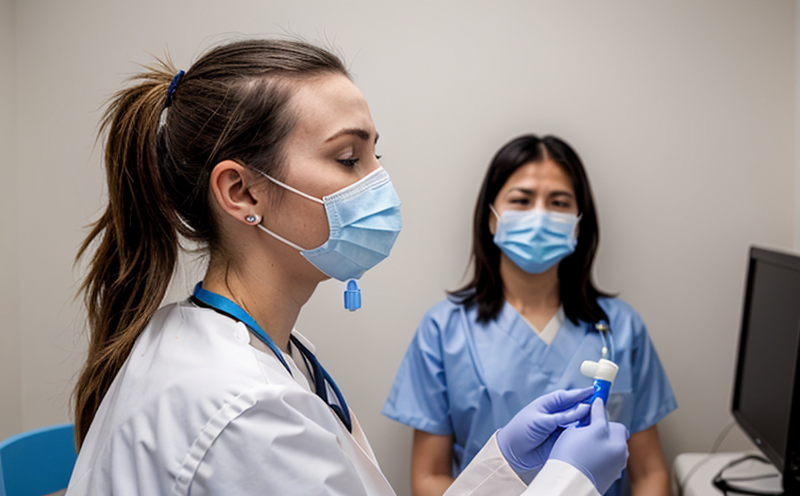Antimicrobial Susceptibility Testing for Respiratory Bacteria
The Antimicrobial Susceptibility Testing (AST) for respiratory bacteria is a critical diagnostic tool used to determine which antibiotics are effective against specific bacterial strains causing respiratory infections. This testing plays an essential role in the treatment of patients suffering from conditions such as pneumonia, bronchitis, and sinusitis.
Respiratory infections can be caused by various bacteria including Pseudomonas aeruginosa, Staphylococcus aureus, Moraxella catarrhalis, and Klebsiella pneumoniae. These bacteria often exhibit resistance to multiple antibiotics, making it imperative for healthcare providers to identify the most effective treatment options. AST provides a clear indication of which drugs are likely to be successful in treating an infection by measuring the minimum inhibitory concentration (MIC) required to inhibit bacterial growth.
The process typically involves inoculating test organisms onto agar plates containing various antibiotics at different concentrations. After incubation, the MIC is determined based on visible zones of inhibition around antibiotic wells. This method ensures precise identification of sensitive and resistant strains. The testing can also be conducted using broth microdilution or Etest methods.
AST results are crucial for clinical decision-making as they help in selecting appropriate antibiotics to minimize treatment failure rates, reduce the incidence of side effects, and prevent the emergence of antibiotic-resistant bacteria. In line with international standards such as ISO 20745 and ASTM D2993, these tests ensure accurate and reliable outcomes.
The accuracy of AST is further enhanced by employing advanced laboratory techniques and equipment such as automated systems like the Vitek 2 or Biomerieux VITEK2. These instruments provide rapid, standardized results that are essential for timely patient care.
Given the diverse nature of respiratory bacteria, it's important to note that not all species exhibit susceptibility patterns similar to those seen in other infections. For instance, Pseudomonas aeruginosa can be particularly challenging due to its innate resistance mechanisms and ability to form biofilms. Therefore, AST is a vital tool for tailoring personalized treatment plans, ensuring better patient outcomes.
The importance of AST cannot be overstated in the context of global antibiotic stewardship programs aimed at conserving the efficacy of existing antibiotics. By identifying resistant strains early on, healthcare providers can implement targeted interventions to preserve the effectiveness of antibiotics and combat the growing threat of antimicrobial resistance (AMR).
Industry Applications
The application of AST in respiratory disease testing extends beyond individual patient care into broader public health initiatives. Hospitals and clinics use this service to monitor trends in antibiotic resistance, which helps in adjusting treatment protocols and informing healthcare policies.
- Quality Management: Ensures adherence to clinical guidelines and best practices.
- R&D Engineers: Utilize AST results to develop new antimicrobial compounds or improve existing ones.
- Compliance Officers: Verify that treatment protocols comply with regulatory standards.
In addition, pharmaceutical companies rely on AST data to assess the efficacy of new antibiotics in clinical trials. By using this information, they can optimize drug formulations and dosage regimens for optimal therapeutic outcomes.
The insights gained from AST are also instrumental in public health campaigns aimed at reducing unnecessary antibiotic usage, thereby combating AMR. This service supports a sustainable approach to healthcare by promoting the judicious use of antibiotics.
Eurolab Advantages
At Eurolab, we pride ourselves on offering comprehensive and accurate AST services tailored specifically for respiratory bacteria. Our advanced laboratory facilities equipped with state-of-the-art technology ensure precise results every time. Here are some key advantages:
- Precision & Reliability: Using the latest methods like Vitek 2, we guarantee reliable outcomes.
- Rapid Turnaround Times: Timely reporting allows for prompt patient interventions.
- Comprehensive Reporting: Detailed reports include all relevant data to support informed decision-making.
- Expert Staff: Our team of highly qualified professionals ensures every test is conducted with the highest standards.
We also offer a range of services beyond AST, including molecular diagnostics and microbiological culture tests, which complement our comprehensive approach to respiratory disease testing. This holistic service offering allows us to provide a complete picture of patient health, ensuring that all aspects of care are addressed effectively.
Our commitment to quality is reflected in the numerous accreditations we hold, such as ISO 15189 and CAP (College of American Pathologists) accreditation. These certifications underscore our dedication to maintaining high standards in laboratory testing and patient care.





